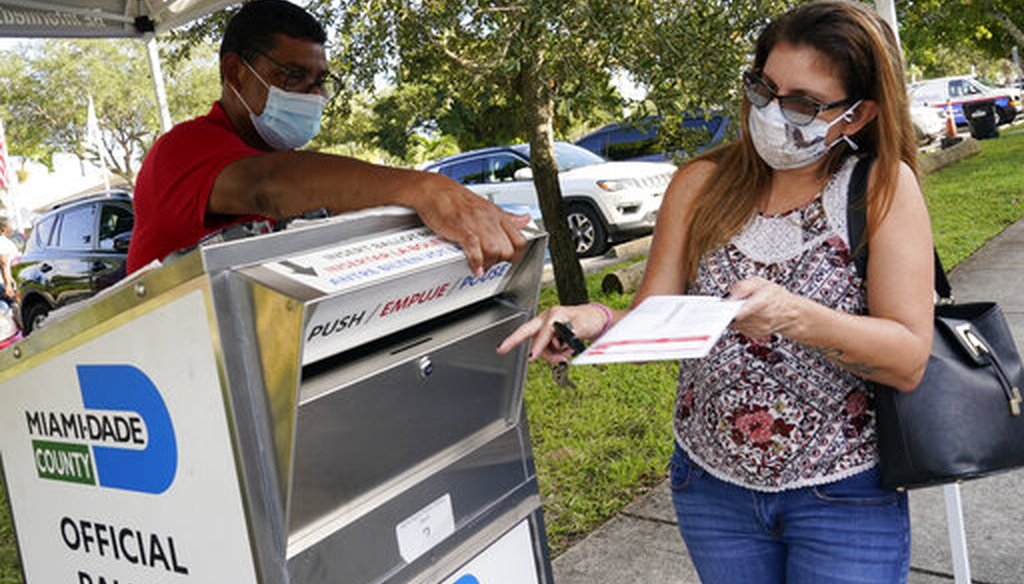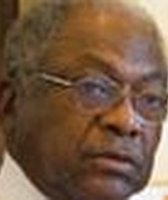Stand up for the facts!
Our only agenda is to publish the truth so you can be an informed participant in democracy.
We need your help.
I would like to contribute

Carlos Amado, left, with the Miami-Dade Supervisor of Elections, guides Isabel Lui to the slot to drop off her ballot, Friday, Oct. 30, 2020 in North Miami, Fla. (AP)
If Your Time is short
- More than 300 election-related lawsuits have been filed this year in dozens of states.
-
In battleground states, the central issues include rules about whether to count ballots that arrive after Election Day, signature verification procedures and ballot drop boxes.
-
Much of the litigation centers on changes made to expand voting by mail due to the pandemic.
In North Carolina, lawyers fought over deadlines to receive mail ballots. In Pennsylvania, they argued over the counting of "naked ballots" lacking a secrecy envelope. And in Harris County, Texas, they sued over drive-thru voting.
Those are just a tiny sample of lawsuits filed across the country ahead of the Nov. 3 election. More than 300 election-related lawsuits have been filed in dozens of states, according to the Stanford-MIT Healthy Elections Project litigation tracker.
So far, the extensive 2020 legal fight is about access to voting.
"Democrats are trying to uphold laws that either extend days of counting ballots and expand opportunities to vote," said Barry Richard, an election lawyer in Florida who has represented both political parties in recounts. "Republicans are trying to get anything that widens voting opportunities struck down."
Both parties are laying the groundwork for post-election night litigation as well.
"We’re going to go in the night of, as soon as that election is over, we’re going in with our lawyers," Trump told reporters in Charlotte, N.C., Nov. 2.
Biden’s team responded that they will protect the vote.
Here’s a pre-Election Day guide to understanding the quick-changing legal battle over 2020.
RELATED: Trump’s cascade of falsehoods about voting by mail
Legal fights over ballot arrivals, signature cures and drop off locations
There have been so many lawsuits that opposing parties have created their own state-by-state litigation trackers. The left’s Democracy Docket, compiled by lawyer Marc Elias and his team, showed active cases in nine states. The Republican National Committee’s election tracker, Protect the Vote, shows a map of lawsuits the GOP filed or joined in about half of the country.
These cases have created a ping pong of decisions in state and federal courts as people cast their ballots. On the eve of Election Day, a Nevada judge ruled against Republicans who challenged Clark County’s mail ballot processing procedures, and a Texas judge ruled that Republicans lacked standing to challenge 127,000 drive-thru votes cast on electronic tablets in Harris County.
U.S. District Court Judge Andrew Hanen, an appointee of President George W. Bush, rejected the GOP argument that drive-thru sites are less secure than in-person.
"I ain’t buying that," Hanen said.
Republicans say that their intent has been to avoid election practices that would lead to chaos, including changes to election policies during the pandemic. Some states made it easier to vote by mail, including sending ballots to all voters.
Republicans say their goal is to ensure a secure elections process.
"While many have been quick to label the Republicans' litigation efforts this year as trying to suppress the vote, in reality the focus of the GOP has been to ensure the integrity of the election process so that all Americans can have confidence that the election results reflect the will of the people," said Michael Thielen, executive director of the Republican National Lawyers Association, told PolitiFact.
Others have been critical of the GOP approach. Longtime Republican lawyer Benjamin Ginsberg wrote in the Washington Post that President Donald Trump and his allies have themselves fueled the myth of voter fraud and aimed to disenfranchise voters as part of his re-election strategy.
"The Trump campaign and Republican entities engaged in more than 40 voting and ballot court cases around the country this year," Ginsberg wrote Nov. 1. "In exactly none — zero — are they trying to make it easier for citizens to vote. In many, they are seeking to erect barriers."
Joe Biden’s campaign has not been a plaintiff in litigation, although the Democratic National Committee or other Democratic groups have been a party in some lawsuits. The DNC wouldn’t comment on how much it had spent on voting war litigation, emphasizing its voter protection work instead. The RNC set aside $20 million for voting litigation as it spread in swing states.
Justin Levitt, a Loyola law school professor and election litigation expert, said that most of the cases were about election rules that existed before the pandemic, including deadlines to submit mail ballots, rules about needing an excuse to vote, and witness or notary signature requirements. The U.S. Supreme Court allowed extensions of mail ballot receipt deadlines in Pennsylvania and North Carolina to stand in October, a win for Democrats.
This year, courts in some cases have demanded that lawyers prove violations of law before the courts have reached conclusions.
Courts have "pretty much rejected, across the board, claims of ‘FRAUD!!’ or ‘SUPPRESSION!!!’ that didn’t have real evidence behind them," Levitt said by email. "Which is to say, the courts have been acting like courts."
Litigation after the polls close
Despite the hundreds of lawsuits and at times changing rules about when and where voters could cast ballots, Americans have turned out in high numbers to vote before Election Day.
"Americans have been resilient in overcoming all sorts of obstacles to get their ballots," said Wendy Weiser, director of the Democracy Program at the Brennan Center for Justice at NYU School of Law. "I am less concerned about what these impacts will have on the actual vote count this year than I am with the long term impact that it is going to have on voting rights in America."
The outcome of the election and any remaining litigation won’t be the only arena to influence policies on ballot access in the future. Congress may have a role to play as well.
In a U.S. Supreme Court case related to Wisconsin ballot deadlines, Justice Neil Gorsuch wrote that it is state legislatures, and not federal or state judges, who bear the primary responsibility for setting election rules.
"And the Constitution provides a second layer of protection, too," Gorsuch wrote. "If state rules need revision, Congress is free to alter them."
Our Sources
Stanford-MIT Healthy Elections Project, COVID-Related Election Litigation Tracker, Accessed Nov. 2, 2020
Republican National Committee, Protect the Vote
Politico, Trump intensifies war with Democrats over voting laws, May 7, 2020
Brennan Center for Justice at NYU, Voting rights litigation, Last updated Nov. 2, 2020
Brennan Center for Justice at NYU, Talking Election Law with the Brennan Center and FiveThirtyEight, Oct. 30, 2020
Election Law Blog, The list of COVID-19 election cases, Nov. 1, 2020
Wall Street Journal, Lawyers Prepare for Court Battles in Pennsylvania, Michigan and Wisconsin, Oct. 31, 2020
Washington Post op-ed by Benjamin Ginsberg, My party is destroying itself on the altar of Trump, Nov. 1, 2020
Nevada Independent, Judge rejects Trump campaign effort to slow down, amend Clark County mail ballot counting and processing system, Nov. 2, 2020
Washington Post, Trump says that as soon as Election Day ends, ‘we’re going in with our lawyers’ Nov. 2, 2020
NPR, Federal Judge Dismisses Effort To Throw Out Drive-Through Votes In Houston, Nov. 2, 2020
Texas Tribune, "It’s wholly un-American": Harris County drive-thru voters await court rulings as Texas Republicans push to invalidate 127,000 votes, Oct. 31, 2020
AP, Supreme Court leaves NC absentee ballot deadline at Nov. 12, Oct. 28, 2020
Houston Chronicle reporter Zach Despart, Twitter thread, Nov. 2, 2020
ABC reporter Johnny Verhovek, Tweet, Nov. 2, 2020
U.S. Supreme Court, DNC vs Wisconsin state legislature, Oct. 26, 2020
PolitiFact, Trump’s cascade of falsehoods about voting by mail, Nov. 1, 2020
Email interview, Michael B. Thielen, executive director of the Republican National Lawyers Association, Nov. 2, 2020
Email interview, Justin Levitt, Loyola law school professor, Nov. 2, 2020
Telephone interview, Wendy Weiser, director of the Democracy Program at the Brennan Center for Justice at NYU School of Law, Nov. 2, 2020
Telephone interview, Barry Richard, Florida lawyer, Nov. 2, 2020












































